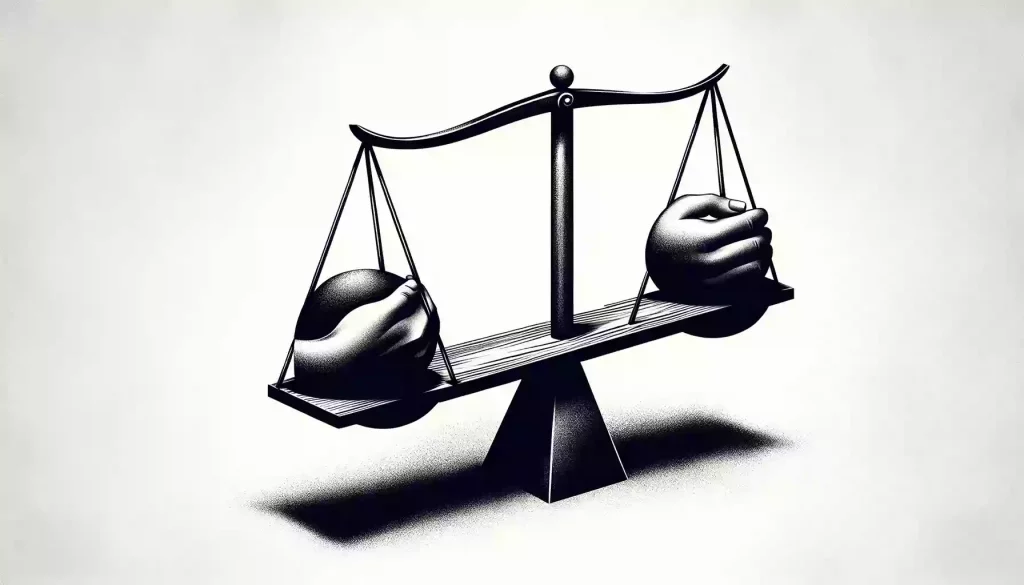Key Takeaways:
- Identifying signs of manipulation
- Impact on mental health
- Effective response strategies
- Importance of setting boundaries
- Seeking support and rebuilding
Introduction to Manipulative Relationships
Manipulative relationships often start subtly, cloaked in a guise of love, care, or intense passion. It's easy to overlook the early signs, as they can be mistaken for deep affection or strong connection. Understanding the nature of these relationships is crucial for recognizing and addressing them.
At its core, a manipulative relationship is characterized by an imbalance of power, where one partner consistently prioritizes their needs and desires over the other's. This dynamic can manifest in various forms, ranging from subtle emotional manipulation to more overt controlling behaviors.
Many people find themselves trapped in manipulative relationships without even realizing it. The gradual escalation of controlling tactics can leave one feeling confused and unsure of their own perceptions. This article aims to shed light on these dynamics, offering insight and guidance for those affected.
Recognizing manipulation requires a keen awareness of one's feelings and the dynamics of the relationship. It often involves identifying patterns of behavior that systematically undermine one's confidence, autonomy, and emotional well-being.
Breaking free from a manipulative relationship is not just about leaving the situation. It's about understanding what drew you into it, learning from the experience, and growing stronger. This journey, while challenging, is a powerful opportunity for personal development and empowerment.
This article serves as a comprehensive guide to navigating and overcoming the complexities of manipulative relationships, providing the tools and knowledge necessary for healing and growth.
Defining Manipulation: What It Is and Isn't
Manipulation in relationships is often misunderstood, leading to confusion about what constitutes manipulative behavior. At its essence, manipulation is about control and power exercised through emotional or psychological tactics.
It's important to differentiate manipulation from normal relationship dynamics. While all relationships involve some degree of negotiation and compromise, manipulation is characterized by a consistent pattern of unbalanced power and control.
Manipulative behavior can take many forms, including guilt-tripping, gaslighting, and passive-aggressiveness. These tactics are often subtle and can be easily overlooked or rationalized by the victim.
A key aspect of manipulation is its impact on the victim's sense of reality and self-esteem. Manipulators often twist facts and use emotional blackmail to undermine their partner's confidence and judgment.
Understanding what manipulation is not is equally important. Disagreements, occasional selfishness, or needing space in a relationship do not necessarily constitute manipulation. It's the consistent pattern and intent behind the actions that distinguish manipulative behavior.
Sign 1: Constant Emotional Rollercoaster

One of the most telling signs of a manipulative relationship is the experience of being on an emotional rollercoaster. This phenomenon is characterized by extreme emotional highs followed by equally intense lows, leaving the victim feeling drained and confused.
The highs in such relationships can be incredibly intoxicating, often marked by intense affection, grand romantic gestures, and promises of commitment. These moments create a powerful bond and a sense of specialness in the relationship.
However, these highs are quickly followed by lows, where the manipulator may withdraw affection, become distant, or engage in hurtful behavior. This sudden shift can leave the victim feeling insecure and desperate to regain the high, creating a cycle of dependency.
This emotional rollercoaster is a deliberate tactic used by manipulators. It's designed to create a psychological dependency that makes it difficult for the victim to leave the relationship. The constant uncertainty keeps the victim off-balance and more easily controlled.
Victims may find themselves constantly trying to navigate the ups and downs, often blaming themselves for the lows. They become consumed with figuring out how to return to the highs, losing sight of their own needs and well-being.
Breaking this cycle requires recognizing the pattern and understanding that it's a form of emotional manipulation. It's about stepping back to objectively assess the relationship dynamics and seeking support to break free from the unhealthy pattern.
Sign 2: Excessive Guilt Tripping
Excessive guilt tripping is a classic sign of manipulation in relationships. Manipulators use guilt as a tool to control and influence the behavior of their partners, often making them feel responsible for the manipulator's emotions and actions.
This tactic involves making the victim feel guilty for actions that are not their fault, such as the manipulator's unhappiness or failures. The manipulator may use phrases like "You always make me feel..." or "If you really cared about me, you would..." to induce guilt.
The impact of constant guilt tripping can be profound. It can erode the victim's self-esteem and autonomy, making them more susceptible to further manipulation. Victims may start to believe they are inherently flawed and undeserving of better treatment.
Recognizing and addressing excessive guilt tripping involves understanding that everyone is responsible for their own emotions and actions. It's about setting boundaries and not accepting undue blame for things beyond one's control.
Sign 3: Gaslighting and Reality Distortion

Gaslighting is a sinister form of manipulation that involves distorting and denying reality to confuse and disempower the victim. It's a tactic that makes the victim question their own memory, perception, and sanity.
In a relationship, gaslighting can take many forms. It might be as subtle as questioning the victim's memory of an event, or as blatant as outright denying something that has clearly happened. The goal is always to make the victim doubt their own experience.
The effects of gaslighting can be devastating. Victims often find themselves in a state of constant self-doubt and confusion. They may feel like they're losing their grip on reality, as they struggle to reconcile their own memories with the false narratives presented by the manipulator.
Overcoming gaslighting requires a strong sense of self and the ability to trust one's own experiences and feelings. It's often necessary to seek external validation and support to break through the fog of manipulation and regain a sense of reality.
Sign 4: Isolation from Friends and Family
Isolation is a powerful tool in the manipulator's arsenal. By gradually distancing the victim from their support network, the manipulator gains more control and reduces the victim's ability to seek help or validation from others.
It often starts subtly, with the manipulator expressing dislike for certain friends or family members. Gradually, they might start to insist on spending more time alone together, framing it as a sign of their love and commitment.
Over time, the victim may find themselves increasingly cut off from their support system. They might stop seeing friends and family as often, or feel guilty about spending time away from the relationship. This isolation can make them more dependent on the manipulator, both emotionally and practically.
Isolation not only reinforces the manipulator's control but also erodes the victim's sense of self. Without the feedback and perspective of others, they may begin to internalize the manipulator's narratives and beliefs.
Reconnecting with friends and family can be a crucial step in breaking free from manipulation. These relationships provide a much-needed reality check and offer support and strength in challenging the manipulative dynamics.
Breaking out of isolation requires deliberate effort and the recognition of its role in the manipulative relationship. Rebuilding these connections can be a vital part of the healing process, helping to restore the victim's sense of self and reality.
Sign 5: Unbalanced Power Dynamics

Unbalanced power dynamics are a definitive sign of a manipulative relationship. This imbalance often manifests in one partner having disproportionate control over decisions, finances, or the overall direction of the relationship.
In such relationships, the manipulator typically assumes a dominant role, making decisions without regard for the other's feelings or opinions. They may justify this behavior under the guise of being more experienced or knowledgeable.
The victim, in contrast, often finds themselves in a submissive position, feeling unable to voice their desires or concerns. This dynamic can lead to a loss of autonomy and self-worth, as the victim's needs and preferences are consistently sidelined.
The imbalance in power can extend to various aspects of life, including social interactions, financial decisions, and daily routines. The manipulator may dictate who the victim can see, how they spend their money, or even what they wear.
Challenging this dynamic requires a conscious effort to reclaim one's power and voice in the relationship. It involves setting boundaries, asserting one's needs, and, in some cases, seeking external support to alter the power balance.
Recognizing the signs of unbalanced power dynamics is the first step towards change. It allows the victim to understand the manipulation at play and take steps to address it.
Ultimately, restoring balance in a relationship is about ensuring that both partners have an equal say and respect each other's autonomy and individuality.
Understanding the Impact of Manipulation on Mental Health
Manipulative relationships can have a profound impact on mental health. The constant stress, confusion, and emotional turmoil can lead to a range of psychological issues, including anxiety, depression, and low self-esteem.
Victims of manipulation often struggle with feelings of worthlessness and inadequacy. The manipulator's constant criticism and control can erode their sense of self, leading to a diminished sense of self-worth.
The psychological toll of living in a state of constant uncertainty and fear can be immense. Victims may experience chronic stress, which can have long-term effects on both mental and physical health.
Healing from the mental health impacts of manipulation involves recognizing the abuse, seeking support, and engaging in self-care practices. Therapy can be particularly beneficial in unpacking the emotional damage and rebuilding a healthy sense of self.
Strategies to Respond to Manipulative Behavior
Responding effectively to manipulative behavior is crucial for regaining control and balance in a relationship. The first step is recognizing the manipulation, which often involves identifying patterns of controlling or abusive behavior.
Once manipulation is identified, communication is key. It's important to express how the behavior affects you, using clear and assertive language. However, it's equally vital to remain calm and not engage in conflict.
Developing a support network can provide emotional strength and perspective. Friends, family, or a therapist can offer advice and validation, helping you to see the situation more clearly and respond effectively.
Setting boundaries is another critical strategy. This means clearly defining what is acceptable and unacceptable in your relationship and standing firm on these boundaries, even when challenged.
It's also important to prioritize self-care. Engaging in activities that boost your self-esteem and well-being can provide the emotional resilience needed to deal with manipulative behavior.
In some cases, taking a break from the relationship might be necessary to gain perspective and strength. This can be a temporary separation or, in extreme cases, leaving the relationship altogether.
Ultimately, responding to manipulation is about empowerment. It involves taking back control of your life and making decisions that are in your best interest, rather than being driven by the manipulator's agenda.
Setting Boundaries in a Manipulative Relationship
Setting boundaries is essential in dealing with a manipulative relationship. Boundaries help define what you are comfortable with and how you expect to be treated by your partner.
It's important to communicate your boundaries clearly and assertively. This means being specific about what behaviors are not acceptable and what the consequences will be if those boundaries are crossed.
Enforcing boundaries can be challenging, especially in a manipulative relationship where they are likely to be tested. Consistency is key; it's crucial to stick to your boundaries once they are set, even if it leads to conflict.
Remember, setting boundaries is not about controlling the other person; it's about respecting yourself and your needs. It's a crucial step in creating a healthier, more balanced relationship.
Seeking Support: When to Reach Out for Help
Recognizing when to seek support is a critical step in dealing with a manipulative relationship. If you find yourself constantly questioning your reality, feeling isolated, or experiencing a decline in mental health, it's time to reach out.
Support can come in various forms, including friends, family, support groups, or professional counseling. Each of these sources offers different perspectives and types of assistance, but all can be valuable in navigating a manipulative relationship.
Professional counseling, in particular, can be instrumental. Therapists can provide an objective perspective, helping you to understand the dynamics of manipulation and develop strategies to respond effectively.
Joining support groups can also be beneficial. Sharing experiences with others who have gone through similar situations can provide comfort, validation, and practical advice.
It's important to remember that seeking help is not a sign of weakness but of strength. It shows a commitment to your well-being and a desire to improve your situation.
In cases where the manipulation is severe or involves physical abuse, it may be necessary to seek immediate help from authorities or specialized organizations dedicated to helping victims of relationship abuse.
The goal of seeking support is to gain the tools and strength needed to make informed decisions about your relationship and your life, free from the influence of manipulation.
Rebuilding Self-Esteem After a Manipulative Relationship
Rebuilding self-esteem after leaving a manipulative relationship is a crucial part of the healing process. The first step is recognizing that the negative self-perceptions instilled by the manipulator are not reflective of your true worth.
Engaging in self-care activities can play a significant role in rebuilding self-esteem. Activities like exercise, pursuing hobbies, and practicing mindfulness can help improve your mood and self-perception.
Setting small, achievable goals can also be beneficial. Accomplishing these goals can provide a sense of achievement and help rebuild your belief in your abilities and worth.
Surrounding yourself with supportive people who affirm your value is another important step. Positive reinforcement from friends and family can help counteract the negative messages from the manipulative relationship.
Finally, consider seeking professional help if needed. Therapy can provide a safe space to process your experiences, understand the impact of the manipulation, and develop strategies to strengthen your self-esteem.
FAQ: Common Questions About Manipulative Relationships
Q1: How can I tell if I'm in a manipulative relationship?
A: Key signs include feeling an imbalance of power, experiencing emotional highs and lows, and noticing a pattern of guilt-tripping or gaslighting.
Q2: Can manipulative relationships change for the better?
A: Change is possible, but it requires the manipulator to acknowledge their behavior and seek help. Both partners must be committed to creating a healthier dynamic.
Q3: Should I confront my partner about their manipulative behavior?
A: Confrontation can be productive if done calmly and assertively. However, in cases of severe manipulation or abuse, seeking professional advice first is advisable.
Q4: How do I leave a manipulative relationship safely?
A: Plan your exit strategy carefully, especially if there are concerns about safety. Seek support from friends, family, or professionals, and consider legal advice if necessary.
Q5: How long does it take to recover from a manipulative relationship?
A: Recovery is a personal journey and varies for each individual. It's important to be patient with yourself and seek support as you navigate the healing process.
Conclusion: Empowering Yourself Moving Forward
Overcoming the challenges of a manipulative relationship is a journey of self-discovery and empowerment. Recognizing the signs and taking steps to address the issues is the first crucial step.
Remember, you have the strength and the right to a healthy, respectful relationship. Setting boundaries, seeking support, and prioritizing your well-being are vital steps in this journey.
Rebuilding self-esteem and regaining a sense of control can be challenging but rewarding. Engaging in activities that nurture your spirit and seeking out positive relationships can aid in this process.
It's important to acknowledge the progress you make, no matter how small. Each step forward is a victory in reclaiming your life and your happiness.
Keep in mind that seeking professional help is a sign of strength, not weakness. Therapists can provide valuable guidance and support as you navigate your path to recovery.
Sharing your story can also be empowering. It not only aids in your healing but can also help others who might be facing similar challenges.
While the journey may be difficult, it leads to a destination of greater self-awareness, strength, and the ability to build healthier, more fulfilling relationships in the future.
Recommended Resources
- Why Does He Do That?: Inside the Minds of Angry and Controlling Men by Lundy Bancroft, Berkley Books, 2003
- In Sheep's Clothing: Understanding and Dealing with Manipulative People by George K. Simon, Parkhurst Brothers Publishers Inc, 2010
- The Sociopath Next Door by Martha Stout, Broadway Books, 2005
- Psychopath Free: Recovering from Emotionally Abusive Relationships With Narcissists, Sociopaths, and Other Toxic People by Jackson MacKenzie, Berkley Books, 2015

.thumb.jpg.78735a344a3340a866dda54f465baebb.jpg)
Recommended Comments
There are no comments to display.
Create an account or sign in to comment
You need to be a member in order to leave a comment
Create an account
Sign up for a new account in our community. It's easy!
Register a new accountSign in
Already have an account? Sign in here.
Sign In Now